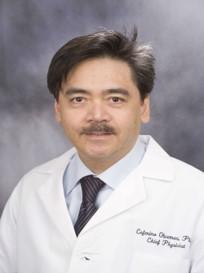
Ceferino Obcemea, Ph.D.
Dr Ceferino Obcemea joined Radiation Research, National Cancer Institute (NCI) in 2017 as Program Director in Medical Physics. He oversees a portfolio of grants that includes all aspects of clinical physics in radiation oncology, novel medical devices, new treatment modalities such as ion beam therapy, on-line imaging techniques as well as the emerging fields of AI applications in radiotherapy, Big Data analytics and machine learning. He also serves as the NCI medical physics liaison to the various clinical trial groups comprising the National Clinical Trials Network (NCTN).
Prior to coming to NCI, Dr. Obcemea had many years of experience as chief physicist at Memorial Sloan Kettering Cancer Center (Westchester campus NY), Beth Israel Medical Center in New York City, and Georgetown University (Frederick campus). He received his clinical training at the Joint Center for Radiation Therapy, Harvard Medical School in Boston and is board-certified by the American Board of Radiology.
Dr. Obcemea completed his Ph.D. in Physics from Uppsala University, Sweden in the fields of many-body scattering theory and non-equilibrium quantum statistical mechanics. He received various research fellowships from the Svenska Institutet (Stockholm), Niels Bohr Institute (Copenhagen), International Center for Theoretical Physics, ICTP (Trieste) and the Quantum Theory Project (QTP) at the University of Florida, Gainesville, among others.
His current interests include machine designs for more affordable, compact, more robust accelerators, harmonization of clinical trial databases for discovery extraction and machine learning, radiomics for radiation oncology, new treatment regimens with particle beams, and biomedical applications of quantum computing and quantum sensing.
Selected Publications
- The United States Department of Energy and National Institutes of Health Collaboration: Medical Care Advances via Discovery in Physical Sciences. Keppel C, Weisenberger A, Atanasijevic T, Wang S, Zubal G, Buchsbaum J, Brechbiel M, Capala J, Escorcia F, Obcemea C, Boehnlein A, Heyes G, Bourne P, Cherry S, Colby E, El Fakhri G, Gillo J, Gropler R, Gueye P, Tourassi G, Peggs S, Woody C. Med Phys. 2023 Mar;50(3):e53-e61.
- Tumor Heterogeneity Research and Innovation in Biologically Based Radiation Therapy From the National Cancer Institute Radiation Research Program Portfolio. Buchsbaum JC, Espey MG, Obcemea C, Capala J, Ahmed M, Prasanna PG, Vikram B, Hong JA, Teicher B, Aryankalayil MJ, Bylicky MA, Coleman CN. J Clin Oncol. 2022 Jun 10;40(17):1861-1869
- The State of Preclinical Modeling for Early Phase Cancer Trials Using Molecularly Targeted Agents with Radiation. Hong JA, Vikram B, Buchsbaum J, Capala J, Livinski A, Teicher B, Prasanna P, Ahmed MM, Obcemea C, Coleman CN, Espey MG. Radiat Res. 2022 Dec 1;198(6):625-631.
- Moving Forward in the Next Decade: Radiation Oncology Sciences for Patient-Centered Cancer Care. Coleman CN, Buchsbaum JC, Prasanna PGS, Capala J, Obcemea C, Espey MG, Ahmed MM, Hong JA, Vikram B.JNCI Cancer Spectr. 2021 May 17;5(4): pkab046.
- FLASH Radiation Therapy: New Technology Plus Biology Required. Buchsbaum JC, Coleman CN, Espey MG, Prasanna PGS, Capala J, Ahmed MM, Hong JA, Obcemea C.Int J Radiat Oncol Biol Phys. 2021 Jul 15;110(4):1248-1249.
Education
- Ph.D. Physics (non-equilibrium statistical mechanics, many-body scattering) Uppsala University, Uppsala, Sweden
- Postdoctoral clinical training, Harvard Medical School, Boston, MA